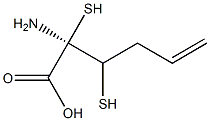| Identification | Back Directory | [Name]
(2R)-2-amino-3-(prop-2-en-1-yldisulfanyl)propanoic acid | [CAS]
2281-22-3 | [Synonyms]
(R)-2-amino-3-(allyldithio)propionic acid
(2R)-2-amino-3-(prop-2-en-1-yldisulfanyl)propanoic acid | [EINECS(EC#)]
822-550-8 | [Molecular Formula]
C6H11NO2S2 | [MOL File]
2281-22-3.mol | [Molecular Weight]
193.287 |
| Hazard Information | Back Directory | [Uses]
3-(2-Propen-1-yldithio)-L-alanine can be useful in the optimization of the method of stem cells mediated tissue remodelling in diabetic wound healing. | [Biological Activity]
S-allylmercaptocysteine, an organic sulfur compound extracted from garlic, has anti-inflammatory and anti-oxidative effects for various pulmonary diseases. S-allylmercaptocysteine achieves its anti-cancer effect through a variety of pathways such as inducing the apoptosis of cancer cells through the TGF-β signaling pathway, or reducing the NF-κB activity and up-regulating Nrf2 to achieve the effects of anti-inflammation and anti-oxidation[1][2][3].
S-Allylmercaptocysteine attenuates cisplatin-induced nephrotoxicity through suppression of apoptosis, oxidative stress, and inflammation[2].S-Allylmercaptocysteine (400 μM; 48 hours) induces apoptosis evaluated by detecting the activated caspase 3 and cleaved PARP in SW620, SW480, and Caco-2 cells. Both activated caspase 3 and cleaved PARP1 are found in the cells treated with SAMC while no activated PARP1 and caspase 3 are found in the untreated control cells[4].
S-Allylmercaptocysteine (25 and 50 mg/kg; oral gavage) could significantly ameliorate the pathological structure, and decrease inflammatory cell infiltration and pro-inflammatory cytokines in bronchoalveolar lavage fluid (BALF) in BLM-induced pulmonary fibrosis mice. S-Allylmercaptocysteine shows an anti-fibrosis effect by increasing anti-oxidants like HO-1, GSH and SOD as well as decreasing hydroxyproline (HYP) in BLM-induced mice[1]. | [References]
[1]. Tong D, et al. S-allylmercaptocysteine promotes MAPK inhibitor-induced apoptosis by activating the TGF-β signaling pathway in cancer cells. Oncol Rep. 2014;32(3):1124-1132. [2]. Zhu X, et al. S-Allylmercaptocysteine Attenuates Cisplatin-Induced Nephrotoxicity through Suppression of Apoptosis, Oxidative Stress, and Inflammation. Nutrients. 2017;9(2):166. Published 2017 Feb 20.
[3]. Li C, et al. S-Allylmercaptocysteine attenuates Bleomycin-induced pulmonary fibrosis in mice via suppressing TGF-β1/Smad and oxidative stress pathways. Int Immunopharmacol. 2020;79:106110.
[4]. Liang D, et al. S-allylmercaptocysteine effectively inhibits the proliferation of colorectal cancer cells under in vitro and in vivo conditions. Cancer Lett. 2011;310(1):69-76. |
|
|






